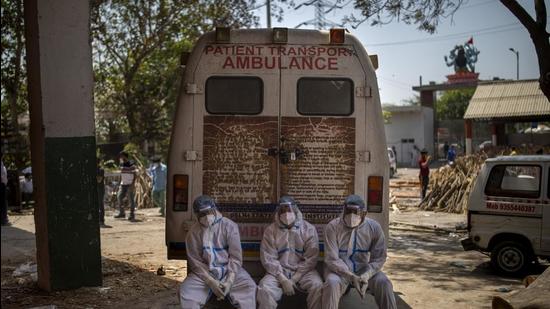Encouraged since the 1970s, bodies continue to be donated in Bengal
Corpses of 13 people, including nine who succumbed to the pandemic, have similarly been donated in West Bengal over the last two months. The donations coincided with reports of dumping of the bodies of suspected Covid-19 patients in rivers in Uttar Pradesh and Bihar
When Saikat Pal, 41, a guest lecturer at a Kolkata university, died of Covid-19 related complications in June, his father, Saroj Pal, a retired Reserve Bank of India employee, chose to donate the body for medical research instead of cremating it.

Corpses of 13 people, including nine who succumbed to the pandemic, have similarly been donated in West Bengal over the last two months. The donations coincided with reports of dumping of the bodies of suspected Covid-19 patients in rivers in Uttar Pradesh and Bihar.
Hundreds of corpses have been donated in Bengal since some leaders in the Left Front government, which ruled the state for 34 years from 1977, began encouraging such donations for organ transplantation and research. Bodies of top Communist leaders such as former chief minister Jyoti Basu, Benoy Choudhury, and Anil Biswas were also donated.
Also Read | India clocks 32,906 single-day Covid-19 cases, 2,020 new deaths reported
Saroj Pal said his son was treated at a reputable private hospital where doctors did their best, but Saikat Pal’s lungs were badly damaged. “When he failed to respond to standard respiratory support systems, I took him to Bangur Hospital where he passed away. I hope the autopsy helped doctors identify what the coronavirus can do to the organs of patients with similar medical history. I have pledged to donate my corneas,” said Pal.
The body of Brojo Roy, a communist who founded Ganadarpan to promote the donation of bodies, was among the corpses donated this year.
Sudipta Saha Roy, who succeeded Brojo Roy as Ganadarpan’s general secretary, said it was founded in 1977 as a cultural organisation. “Ganadarpan got its registration certificate in 1980. On November 5, 1986, (Brojo) Roy and 33 of his friends pledged to donate their bodies. Since then, 3,000 bodies have been donated, including that of (Brojo) Roy who died on May 13 at the age of 84.”
The body of one Sukumar Hom Chaudhury was the first to be donated on January 8, 1990, as part of the campaign.
Sudipta Saha Roy said a parallel campaign started in Bangladesh where, in 1985, the body of Araj Ali Matubbar was the first to be donated to the Barisal Medical College. “He was a farmer with little formal education but great interest in science.” He added that more people have overcome their taboos and the campaign needs to get more organised. “For example, besides collecting corneas, skin from a human body can be used for grafting. Eardrums can be used too. For all this, infrastructure in hospitals in Bengal needs to be upgraded.”
Dr Kalyan Kar, who heads the surgery department at a Kolkata hospital, said body donations help medical students a lot. “Dissection and analysis help them understand the human anatomy much better. The movement contributes to medical studies.”
The state health department encourages people to donate organs through its State Organ Tissue Transplantation Organisation. In August 2020, the liver and lungs of a man, who was declared brain dead at a Kolkata hospital, were flown to Hyderabad for transplantation. His skin and corneas were transplanted at two hospitals in Kolkata. In November 2018, Calcutta Medical College and Hospital became the first state-run hospital in Bengal to successfully transplant a heart. Two private hospitals in Kolkata conducted four heart transplant operations before that.





